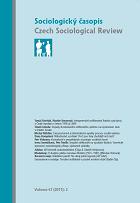Dopady dvoukolového většinového systému na reprezentaci stran v českém Senátu
The Impact of the Majority Runoff System on Party Representation in the Czech Senate
Author(s): Tomáš LebedaSubject(s): Social Sciences
Published by: AV ČR - Akademie věd České republiky - Sociologický ústav
Keywords: electoral behaviour; party representation; majority runoff system
Summary/Abstract: The objective of this article is to describe the impact of the majority runoff system on the electoral process and especially on party representation in elections to the Czech Senate. The article addresses the following questions: How are individual political parties represented? How much are electoral decisions influenced by the political party and how much by who the individual candidate is? What is the difference in the success rate of individual parties in the first and runoff election rounds? Which parties benefited from this electoral system and which are disadvantaged by it? Does the majority runoff system have a curbing effect on the representation of extremist parties? How does the personality of the candidate contribute to an election outcome? The article analyses the results of seven Senate elections between 1996 and 2008. The data file for the analysis includes all the candidates who ran for the Senate during this period (a total of 1685 candidates). The results of the analysis are contrasted with existing theoretical assumptions about the impact of the majority runoff system and in particular Duverger’s laws.
Journal: Sociologický časopis / Czech Sociological Review
- Issue Year: 47/2011
- Issue No: 02
- Page Range: 243-271
- Page Count: 29
- Language: Czech

